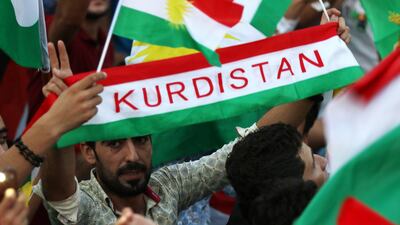Kurdish leaders in Iraq are likely to push ahead with their independence referendum despite calls to suspend next week's vote, a leading analyst told The National.
On Monday, the Iraqi Supreme Court ordered that the poll – planned for September 25 – must be postponed until questions over its legality were addressed.
Iraqi prime minister Haider Al Abadi has also formally demanded the suspension of the vote, while neighbours Turkey and Iran, as well as the United States and United Nations, have pleaded for the autonomous Kurdish region of northern Iraq to settle its differences with Baghdad through negotiations rather than secession.
But Professor Gareth Stansfield, senior associate fellow at the Royal United Services Institute, said he expects Kurdish leaders to ignore these demands.
“The simple fact is that the [Iraqi] constitution doesn’t have a provision in it for secessionist movements, therefore it’s neither legal nor illegal,” he said.
“Irrespective of that, I can’t imagine that the Barzani team will pay much attention to what the court in Iraq is saying.”
_______________
Read more:
Iraq supreme court orders suspension of Kurdish referendum
KRG referendum won't impact Iraqi oil production, says minister
_______________
In a new report, Professor Stansfield argues that Kurdish leaders view the move towards independence as a “logical, and perhaps even necessary” initiative, and that Middle Eastern states and other regional powers may be more prepared to accept this aspiration than their Western counterparts.
“The orthodox view is that Turkey, Iran and the Arab states would oppose Kurdish independence because they want to preserve Iraq’s integrity,” he said.
“However, you can make an interesting case that perhaps Turkey especially, but also the Arab states, would view the emergence of an independent Kurdistan republic more favourably now."
While Turkey’s reaction is hard to predict, Professor Stansfield suggested it is not guaranteed that it will block any secessionist movement.
“It is very difficult to read what happens with Turkey, but we need to be a little bit more careful in saying it will just oppose this,” he said.
“Turkey could have stopped this whole initiative at any time over the past two years.
“Yes, there are lots of public pronouncements about it, but then you start to look at the nature of the relationship and what it’s been doing or not doing, and you can make a counter-intuitive case that it is actually quite supportive of independence.”
As for Iran, Professor Stansfield argues it has “no particular view” on preserving Iraqi integrity, while he notes that Arab states have developed “extremely strong relationships” with Erbil over the past few years, with a number of consulates opening up in the region, and new trade relationships.
“There has also been quite a groundswell of support for Kurdish independence coming from Saudi Arabia, visible on Twitter and Facebook and so on,” he added.
_______________
Read more:
UN chief urges Iraq Kurds to scrap referendum
Military intervention possible in Kurdish independence, Iraqi PM says
_______________
Instead, Professor Stansfield argues it is the Europeans and Americans, rather than neighbouring countries, that are most concerned about a Yes vote.
The West has voiced strong opposition to the referendum as there are concerns that it will provoke further instability in the country and impede the battle against ISIL.
However, Professor Stansfield says this position is hard for the West to defend, given the historical parallels with other referenda.
“If you are the British ambassador, trying to argue this with Masoud Barzani, you’re in a fundamentally weak position because Scotland has held a referendum on its independence and it didn’t include English voters. The UK held a referendum on leaving the EU, and didn’t include any other European voters.
“So, the model for the Kurds to hold a referendum on leaving Iraq and not include Arab voters arguably has been made in the British Isles anyway.
“It is a very tricky one for Western diplomats to argue.”
Professor Stansfield added that what the Kurds are actually asking for should not be seen as deeply problematic.
“The whole process of holding a referendum on self-determination is enshrined in the English human rights law of the United Nations, so there is nothing fundamentally illegal about this. It is a democratic expression of self-determination.”
Indeed, Mr Barzani has himself said that a Yes vote would not trigger an immediate declaration of independence, but rather kick-start “serious discussions” with Baghdad.
“The Kurds are not going to declare an independent republic on the 26th of September, according to Barzani – they are going to engage in a process of negotiations with Baghdad and other countries to try and charter a durable and peaceful secession from Iraq. All of this is perfectly reasonable,” he said.
“Rather than saying: ‘This is ridiculous, this can never happen,’ which is standing against a democratic expression, it is perhaps better for other powers to say: ‘We will watch with interest how this develops, but we hope that it is transparent, that due process is followed, that it is democratic, and that there is no problem at the polls.
“That seems a more sensible way of doing it.”

